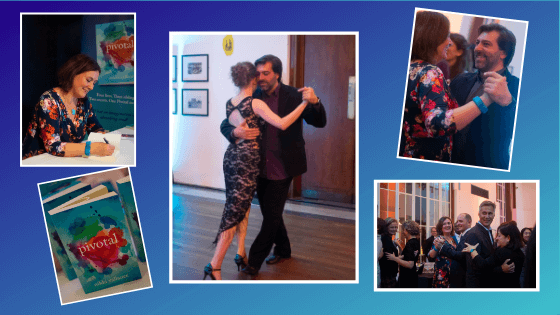At the launch of Pivotal on 17th October 2019, Antonio Riva of Tango Bridge UK treated everyone to a surprise Tango demonstration. Antonio had agreed to collaborate and I billed him as ‘The Mystery Man’ beforehand in order to keep the Tango connection with the book a secret. The evening was a great success, as you can see from the photos taken on the night. (Pre social distancing of course!) As part of the 1st anniversary celebrations focusing on Pivotal’s themes, Antonio kindly agreed to help me again by answering some questions for my blog on his Tango life and our collaboration. I learnt a lot and found his answers moving and inspirational. I hope you do too.
Tell me a little about yourself and how you first became interested in the Argentine Tango.
I am a qualified dance teacher, and I have been teaching Argentine Tango in London for more than 10 years. Tango is a wonderful dance, and once you fall in love with it, it stays with you forever! I was always interested in Tango music (I have a music background), and the decision to learn the dance just came as a complement to listening to Tango music. I found some classes taught at the local community centre, and I decided to try them. I was hooked from lesson 1! I have been running TangoBridgeUK for a few years now, and planning on continuing once the COVID crisis will allow us to restart dancing safely.
Some of the characters in Pivotal are offered the chance to set up a Tango school. How did you end up teaching Tango and what advice would you give them for their business to be successful?
When I was learning Tango (oh my, does one actually ever stop learning Tango?), I progressed very quickly through all the levels taught by my teachers, I took many many extra classes and I joined an amateur Tango performance group, performing on stage in and around London. At some point, my mentor asked me to shadow him during his classes, then to start teaching beginners, and then all the way to leading his performance group, his events and his school.
When the school closed, I went “solo” for some time and obtained my qualification as a dance teacher, and then I set up the current TangoBridgeUK team. I think the best advice I can give to anyone who would like to open a new Tango school is to train hard and persevere! Learn the dance, learn it well, become the dance, dance it, love it. Don’t just decide to open a school overnight, because a Tango school is not just an “event”. Tango dancers are romantic and emotional, and each school is like a family.
Plus, always remember that your students are not stupid and will definitely be able to tell if you are trained and serious or not. Persevere. Get to know the local Tango groups, understand the local Tango politics, and don’t piss anyone off! Your colleagues are your best friends in this adventure. Try to stand out for the type of teacher you are, not because you just “fit in”. Don’t pretend to be someone you are not and understand that Tango is not you!
Tango is for everyone, and even if there may be different ways of teaching and dancing it, this should not compromise the basics, the main teachings of it. You will not invent a new version of Tango, but you are here to continue the tradition. Tango is part of UNESCO’s humanity heritage. Honour this.
What misconceptions do your clients have before they learn the dance and how do you help them overcome them?
I have to say, many clients come to their first classes with no initial expectations; they really just want to learn this dance and see what it is; this is the best approach.
Some come to their first classes believing Tango is a “dating event”; WRONG. Some come to their first classes believing Tango is about “love and sex”: WRONG. Some come to their first classes with the idea that Tango is “macho”, and it is a way for the man to show power and dominance: COULDN’T BE MORE WRONG. Some come to their first classes believing Tango is just another dance: WRONG again. How do I contrast these preconceptions? Well, I just tell the students that they are wrong, simply. And I think through my teaching it becomes clear pretty quickly that Tango is none of those things.
How has the Covid 19 crisis impacted you, your clients and your business?
In very simple terms, COVID-19 has stopped any and every social Tango activity. Classes are suspended, social dancing is suspended, venues are closed and we just don’t know when we will be able to re-start safely. Don’t believe when venues tell you that they have made Tango COVID-safe. It is just not possible: you dance Tango breathing your partner’s breath, and there is no social distancing in this dance. Masks are not going to make a difference if you are spending minutes just few inches away from another person.
Sure, you can organise underground events, irregular gatherings and so on. And you may be lucky. But we have to be sensible with this, and if this means missing a few months of social classes and social dancing, then so be it. It is not the first time in history that Tango goes into hibernation, and probably it won’t be the last. But Tango will always resurface.
Unfortunately, the worst in all this is really not that dancing is temporarily suspended, but that many Tango teachers only live off Tango and have no other sources of income to support them through these difficult times. And with Tango not being recognised as an independent art form (to the extent of ballroom dances, for instance), government support is difficult to obtain. The Tango community is great, and there have been some wonderful initiatives to support one’s local teachers. But this is not enough. We do need support. We, Tango teachers, organisers, DJs, dance operators in general, are trying to put together an official national association for Argentine Tango (like it has happened in other countries worldwide), and hopefully when this is achieved we will be able to at least obtain and provide what has been missing for many of us during this COVID era.
I thoroughly enjoyed our collaboration for the Pivotal launch party. I can’t believe it’s already a year ago. The guests were delighted with the surprise taster lesson you gave us. What do you remember most about the evening?
I remember the buzzing feeling, the creative atmosphere and the perfect mix of reading, music, dancing and just having a great time in the wonderful venue where you held your book launch. It was just perfect!
Have you or has anyone else you know read the book yet? If yes: What did you think, especially about the Tango backstory and how it came across?
This book portrays Tango well. Fiction often takes fragments of Tango and misuses them. And the film industry does not help, as actors are often not trained properly to actually dance the dance. Luckily, things are not always so negative, and some Tango-loving authors and film-makers have accepted the challenge to show what Tango really is. But always remember, Tango is a personal journey, initially it is often an incidental or serendipitous find in one’s life, and it roots so deeply inside of you that it can be extremely difficult to describe what it really is for you, how it changes your life. And being so personal, one’s own story may just not be enough to entice others.
The thing is, if you want to feel Tango, then you just have to do it yourself. If you don’t want to take group classes, search for private classes. But remember that what is portrayed in books and movies is often just a platonic shadow of what Tango really is.
What’s the one piece of advice you would give to anyone considering taking up the Tango, particularly in the current climate of social distancing?
Just do it. Don’t think twice. Try it. Yes, difficult with social distancing, ok. But you can still start educating yourself by listening to music, reading about the history of the dance, and (I can’t believe I’m about to say this… — generally not a good way to go about learning Tango) look for YouTube videos (performances by maestros are better than many YouTube “classes”). You will also find that many IT-savvy teachers have set off to create online classes via Zoom or other platforms, and these work really well IF you are at a certain more advanced level of dancing. Tango is a very beautiful and very gentle type of physical activity, and in times of lockdown (if you have enough space in your kitchen or living room) you can use it as a wonderful way to keep your muscles and bones moving.
You don’t need a partner for this, and in any case, remember that one of the ‘tenets’ of Tango is that if you can’t dance it well by yourself AND WITH yourself, then your dances with a partner will also be negatively affected by this. Remember, Tango is wonderful; if you respect it, it will respect you back.
If you would like to learn more about Tango and hear Antonio’s news you can reach him via the TangoBridgeUK website and if you enjoyed this blog and would like to know receive notifications of don’t forget to sign-up here!
©Nikki Vallance 2020 Photo Credit: Xanthe Nimmo.

